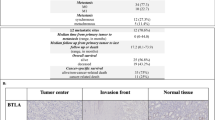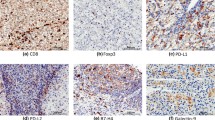Abstract
Purpose
This study aimed to evaluate the density of CD8+ and CD3+ tumor-infiltrating lymphocytes (TILs) and determine whether the immunoscore has any prognostic effect on the oncological outcomes in patients with clear cell renal cell carcinoma (RCC).
Materials and methods
A total of 129 patients diagnosed with clear cell RCC following radical or partial nephrectomy between 2009 and 2014 were retrospectively analyzed. Both tumor core (CT) and the invasive margin of nephrectomy specimens were assessed. The specimens were immunostained for anti-CD8+ and anti-CD3+ TILs. The patients were divided into three groups (favorable, intermediate, and poor risk) according to immunoscore levels.
Results
In the multivariate analysis, a favorable immunoscore (I3–4) was associated with prolonged disease-free survival (DFS), progression-free survival (PFS), and overall survival (OS) (HR 2.652, 2.848, and 2.933, respectively; all p < 0.001). The lower Fuhrman grade and pathological tumor-node-metastasis (TNM) stage had better DFS, PFS, and OS, whereas prolonged PFS was associated with a higher density of CD8+ CT (HR 1.602, 95% CI 0.934–3.470; p = 0.014). The shorter DFS, PFS, and OS were observed in the group with poor immunoscore (I0–1) at the early TNM stage of RCC (p < 0.001). In the metastatic subgroup analysis, the immunoscore showed better estimation than the International Metastatic RCC Database Consortium model and the Memorial Sloan-Kettering Cancer Center risk model for progression and OS (p < 0.001).
Conclusion
The additional contributions of immunoscore to TNM stage, Fuhrman grade, and the WHO/ISUP 2016 grade for estimating oncological outcomes were found in ROC analysis. According to our preliminary results, immunoscore can be a promising prediction tool in clear cell RCC for postoperative oncological outcomes following nephrectomy.








Similar content being viewed by others
References
Rendon RA, Kapoor A, Breau R et al (2014) Surgical management of renal cell carcinoma: Canadian Kidney Cancer Forum Consensus. Can Urol Assoc J 8:398–412
Lipworth L, Tarone RE, McLaughlin JK (2006) The epidemiology of renal cell carcinoma. J Urol 176:2353–2358
Ljungberg B, Albiges L, Bensalah K et al (2019) European Association of Urology guidelines on renal cell carcinoma: the 2019 update. In. ISBN 978-94-92671-04-2. EAU Guidelines Office, Arnhem, The Netherlands. ISBN 978-94-92671-04-2. http://uroweb.org/guidelines/compilations-of-all-guidelines/. Accessed 19 Mar 2019
Galon J, Pagès F, Marincola FM, Thurin M, Trinchieri G, Fox BA et al (2012) The immune score as a new possible approach for the classification of cancer. J Transl Med 10:1–4
Galon J, Mlecnik B, Bindea G, Angell HK, Berger A, Lagorce C et al (2014) Towards the introduction of the ‘Immunoscore’ in the classification of malignant tumours. J Pathol 232:199–209
Kim JK, Kim SH, Song MK, Joo J, Seo SI, Kwak C et al (2019) Application of the international metastatic renal cell carcinoma database consortium and memorial Sloan Kettering cancer center risk models in patients with metastatic non-clear cell renal cell carcinoma: a multi-institutional retrospective study using the korean metastatic renal cell carcinoma registry. Cancer Res Treat 51(2):758–768
Bindea G, Mlecnik B, Angell HK, Galon J (2014) The immune landscape of human tumors implications for cancer immunotherapy. OncoImmunology 3:27456–27458
Mlecnik B, Bindea G, Angell HK, Maby P, Angelova M, Tougeron D et al (2016) Integrative analyses of colorectal cancer show immunoscore is a stronger predictor of patient survival than microsatellite instability. Immunity 44(3):698–711
Kirilovsky A, Marliot F, Sissy CE, Haicheur N, Galon J, Pagès F (2016) Rational bases for the use of the immunoscore in routine clinical settings as a prognostic and predictive biomarker in cancer patients. Int Immunol 28:216–226
Mlecnik B, Van den Eynde M, Bindea G, Church SE, Vasaturo A, Fredriksen T et al (2018) Comprehensive intrametastatic immune quantification and major impact of immunoscore on survival. J Natl Cancer Inst. https://doi.org/10.1093/jnci/djx123
Anitei MG, Zeitoun G, Mlecnik B, Marliot F, Haicheur N, Todosi AM et al (2014) Prognostic and predictive values of the immunoscore in patients with rectal cancer. Clin Cancer Res 20(7):1891–1899
Rabjerg M (2017) Identification and validation of novel prognostic markers in renal cell carcinoma. Dan Med J 64(10):B5339
Fridman WH, Pagès F, Sautès-Fridman C, Galon J (2012) The immune contexture in human tumours: impact on clinical outcome. Nat Rev Cancer 12:298–306
Hanahan D, Weinberg RA (2011) Hallmarks of cancer: the next generation. Cell 144:646–674
Fridman WH, Zitvogel L, Sautès-Fridman C, Kroemer G (2017) The immune contexture in cancer prognosis and treatment. Nat Rev Clin Oncol 14(12):717–734
Ingels A, Salas RES, Ravery V, Fromont-Hankard G, Validire P, Patard JJ et al (2014) T-helper 1 immunoreaction influences survival in muscle-invasive bladder cancer: proof of concept. Ecancer Med Sci 8:486
Sharma P, Shen Y, Wen S, Yamada S, Jungbluth AA, Gnjatic S et al (2007) CD8 tumor-infiltrating lymphocytes are predictive of survival in muscle-invasive urothelial carcinoma. Proc Natl Acad Sci USA 104:3967–3972
Ascierto PA, Capone M, Urba WJ, Bifulco CB, Botti G, Lugli A et al (2013) The additional facet of immunoscore: immunoprofiling as a possible predictive tool for cancer treatment. Journal of Translational Medicine 11:54–57
Yu A, Mansure JJ, Solanki S, Siemens DR, Koti M, Dias ABT et al (2018) Presence of lymphocytic infiltrate cytotoxic T lymphocyte CD3+ , CD8+ , and immunoscore as prognostic marker in patients after radical cystectomy. PLoS One 13(10):e0205746. https://doi.org/10.1371/journal.pone.0205746.eCollection2018
Galon J, Pagès F, Marincola FM, Angell HK, Thurin M, Lugli A et al (2012) Cancer classification using the immunoscore: a worldwide task force. J Transl Med 10:205–213
Sun C, Xu J, Song J, Liu CQ, Wang J, Weng C et al (2015) The predictive value of centre tumour CD8+ T cells in patients with hepatocellular carcinoma: comparison with immunoscore. Oncotarget 34:35602–35615
Mlecnik B, Tosolini M, Kirilovsky A, Berger A, Bindea G, Meatchi T et al (2011) Histopathologic-based prognostic factors of colorectal cancers are associated with the state of the local immune reaction. J Clin Oncol 29:610–618
Faraj S, Munari E, Guner G, Taube J, Anders R, Hicks J et al (2015) Assessment of tumoral PD-L1 expression and intratumoral CD8+ T cells in urothelial carcinoma. Urology 85:703–708
Horn T, Laus J, Seitz AK, Maurer T, Schmid SC, Wolf P et al (2016) The prognostic effect of tumour-infiltrating lymphocytic subpopulations in bladder cancer. World J Urol 34:181–187
Baine MK, Turcu G, Zito CR, Adeniran AJ, Camp RL, Chen L et al (2015) Characterization of tumor infiltrating lymphocytes in paired primary and metastatic renal cell carcinoma specimens. Oncotarget 6:24990–25002
Harter PN, Bernatz S, Scholz A, Zeiner PS, Zinke J, Kiyose M et al (2015) Distribution and prognostic relevance of tumor-infiltrating lymphocytes (TILs) and PD-1/PD-L1 immune checkpoints in human brain metastases. Oncotarget 6(38):40836–40849
Nivolumab in Treating Patients With Localized Kidney Cancer Undergoing Nephrectomy (PROSPER). NCT03055013. https://clinicaltrials.gov/ct2/home. Accessed 24 May 2017
A Study of Atezolizumab as Adjuvant Therapy in Participants With Renal Cell Carcinoma (RCC) at High Risk of Developing Metastasis Following Nephrectomy (IMmotion010). NCT03024996 Available at:https://clinicaltrials.gov/ct2/home. Accessed 24 May 2017
Zahoor H, Pavicic PG Jr, Przybycin C, Ko J, Stephens L, Radivoyevitch T et al (2018) Evaluation of T cell infiltration in matched biopsy and nephrectomy samples in renal cell carcinoma. Medicine (Baltimore) 97(37):e12344
Funding
This work is financially supported by Health Science University Dr. Abdurrahman Yurtaslan Ankara Oncology Training and Research Hospital through the scientific research fund with the decision of dated 03.11.2017 and numbered 1.
Author information
Authors and Affiliations
Contributions
IS: conception and design, acquisition of data, statistical analysis, analysis and interpretation of data, and drafting of the manuscript. UD: conception and design, and critical revision of the manuscript for important intellectual content. NB: analysis and interpretation of data, pathological evaluation, and critical revision of the manuscript for important intellectual content. HB: critical revision of the manuscript for important intellectual content.
Corresponding author
Ethics declarations
Conflict of interest
The authors declare that they have no conflict of interest.
Ethical approval for research involving human participants
The study was approved by the local ethics committee (the protocol number: 2018-02/18; the date of approval: February 7, 2018) at Health Science University Dr. Abdurrahman Yurtaslan Ankara Oncology Training and Research Hospital. All procedures performed in our study involving human participants were in accordance with the ethical standards of the institutional and national research committee and with the 1964 Helsinki Declaration and its later amendments or comparable ethical standards.
Informed consent
Informal written informed consent was obtained from all individual participants included in the study. The data of patients who did not consent were not used.
Additional information
Publisher's Note
Springer Nature remains neutral with regard to jurisdictional claims in published maps and institutional affiliations.
Institution where the work was developed, city and country: Health Science University Dr. Abdurrahman Yurtaslan Ankara Oncology Training and Research Hospital, Ankara, Turkey.
Rights and permissions
About this article
Cite this article
Selvi, I., Demirci, U., Bozdogan, N. et al. The prognostic effect of immunoscore in patients with clear cell renal cell carcinoma: preliminary results. Int Urol Nephrol 52, 21–34 (2020). https://doi.org/10.1007/s11255-019-02285-0
Received:
Accepted:
Published:
Issue Date:
DOI: https://doi.org/10.1007/s11255-019-02285-0




